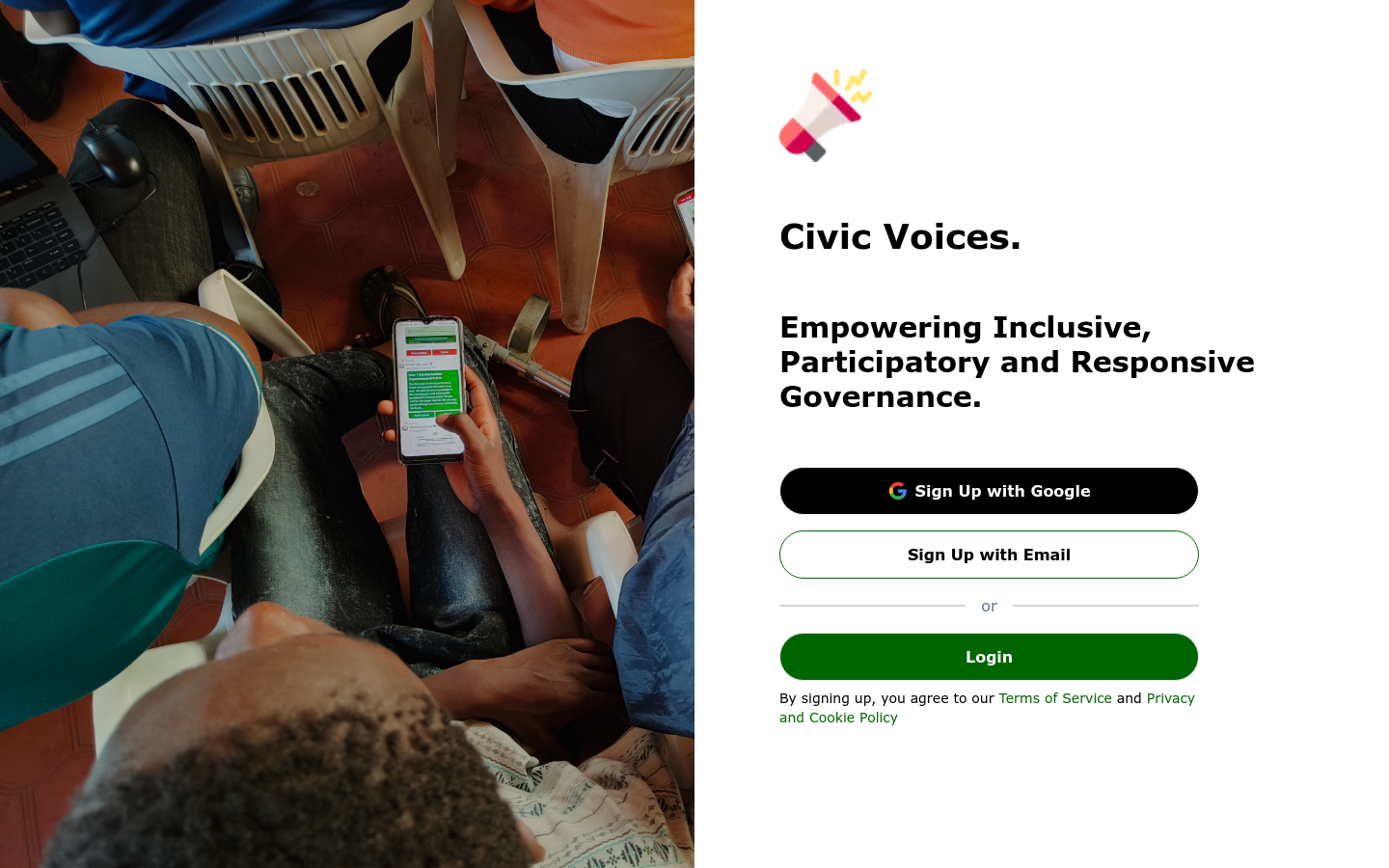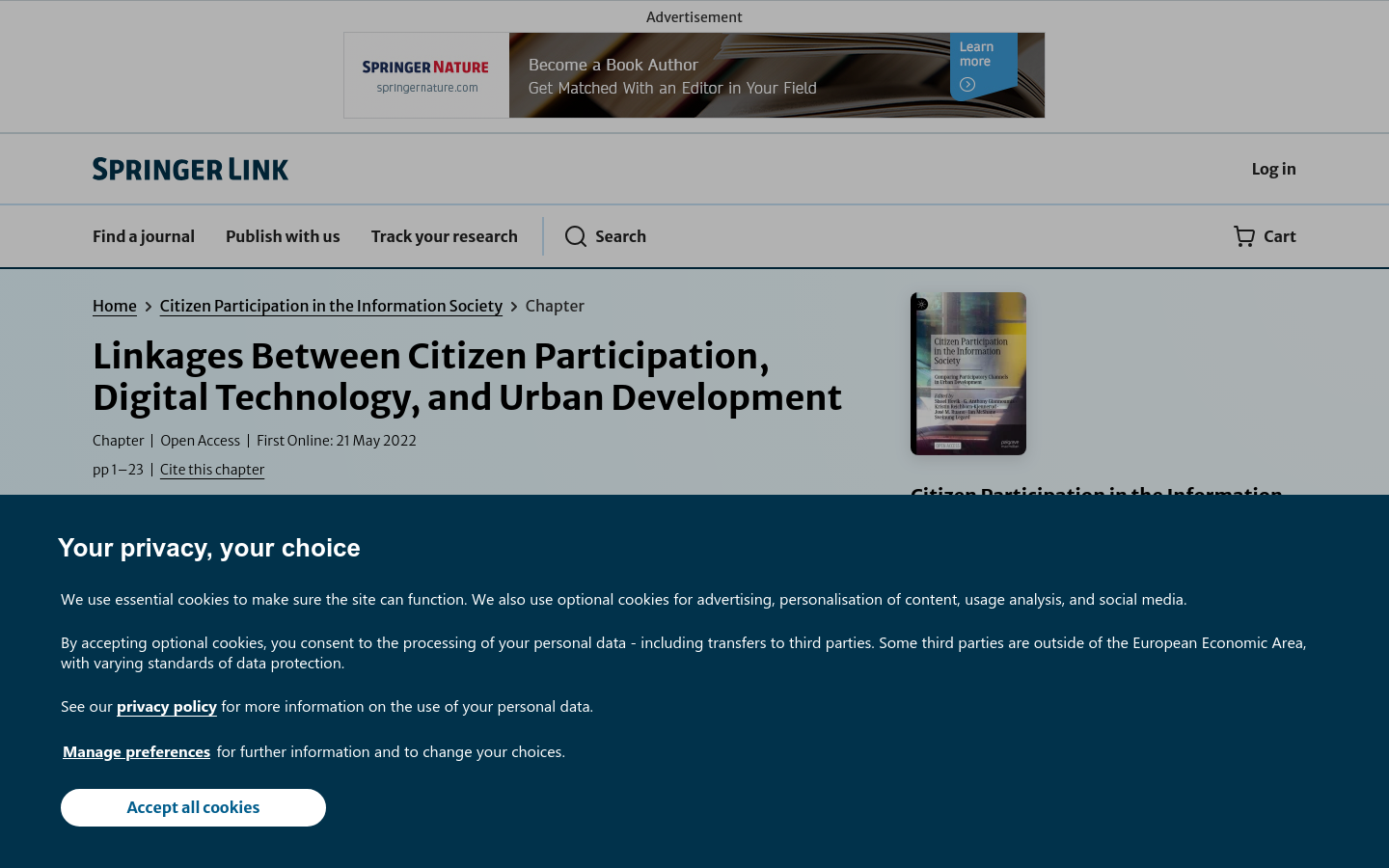Civic Tech Field Guide
Sharing knowledge and productively growing the fieldSearch Results - engagement (1417)
Showing 1417 Results

deliberAIde
BerlinWe are developing an end-to-end platform for in-person, online and hybrid deliberative participation processes, starting with: AI-assistance for defining the process; anonymously transcribing and documenting deliberations; summarization and in-depth analysis; and final reporting.

The Oxford Handbook of Political Participation provides the first comprehensive, up-to-date treatment of political participation in all its varied forms, investigates a wide range of topics in the field from both a theoretical and methodological perspective, and covers the most recent developments in the area

This book argues that ethical evaluation of AI should be an integral part of public service ethics and that an effective normative framework is needed to provide ethical principles and evaluation for decision-making in the public sphere, at both local and international levels

The book revolves around recent developments in specific scientific disciplines, including biology, ecology, computer science, astronomy, and cognitive science.

This book explores the potential of the Internet for enabling new and flexible political participation modes.

In Sharing Cities, Duncan McLaren and Julian Agyeman argue that the intersection of cities' highly networked physical space with new digital technologies and new mediated forms of sharing offers cities the opportunity to connect smart

Why are some civic associations better than others at getting - and keeping - people involved in activism? From MoveOn.org to the National Rifle Association, Health Care for America Now to the Sierra Club, membership-based civic associations constantly seek to engage people in civic and political action. What makes some more effective than others? Using in-person observations, surveys, and field experiments, this book compares organizations with strong records of engaging people in health and environmental politics to those with weaker records. To build power, civic associations need quality and quantity (or depth and breadth) of activism. They need lots of people to take action and also a cadre of leaders to develop and execute that activity. Yet, models for how to develop activists and leaders are not necessarily transparent. This book provides these models to help associations build the power they want and support a healthy democracy. In particular, the book examines organizing, mobilizing, and lone wolf models of engagement and shows how highly active associations blend mobilizing and organizing to transform their members' motivations and capacities for involvement. This is not a simple story about the power of offline versus online organizing. Instead, it is a story about how associations can blend both online and offline strategies to build their activist base. In this compelling book, Hahrie Han explains how civic associations can invest in their members and build the capacity they need to inspire action.

The book offers a valuable interdisciplinary dialogue on the challenges and opportunities of the increasingly influential space of civic media

Just what is the “participatory condition”? It is the situation in which taking part in something with others has become both environmental and normative

This Handbook concentrates on democracy beyond the traditional governmental structures to explore the full scope of participatory governance.

MosaicLab
Melbourne VIC, Australiawe’re a highly experienced team of facilitators and community engagement practitioners specialising in high influence and deliberative engagement

Bringing together perspectives from around the world, this volume examines emerging forms of citizen participation in the face of the evolving logics of political communication, and provides a unique and original focus on the gap which ...

Starting from the 1980s, this book provides the first, complete history of the idea of deliberative democracy, analysing its relationship with the earlier idea, and practices, of participatory democracy in the 1960s and 1970s.

This book is about the principles behind the open government data movement and its development in the United States.

However, this book also shows that citizens can become disappointed by the little decision-making power they are granted, as they leave the process often more cynical than before.

This book examines the increasing popularity of online citizen science projects arising from developments in ICT and rapid improvements in data storage and generation.

This book examines how international organisations (IOs) have struggled to adapt to the digital age, and with social media in particular

In Citizen Science in the Digital Age: Rhetoric, Science, and Public Engagement, Wynn analyzes the discourse that enables these scientific ventures, as well as the difficulties that arise in communication between scientists and lay people and the potential for misuse of publicly gathered data.

Whether you're an IT specialist, a city planner, a human resources manager, or any other professional in local government, this book offers a wide array of prompts designed to stimulate innovative solutions, streamline operations, and ...

In light of the increased utilization of information technologies, such as social media and the ‘Internet of Things,’ this book investigates how this digital transformation process creates new challenges and opportunities for political

This book critically investigates the complex interaction between social media and contemporary democratic politics, and provides a grounded analysis of the emerging importance of Social media in civic engagement.

Is this true? In Uneven Innovation, Jennifer Clark considers the potential of these emerging technologies as well as their capacity to exacerbate existing inequalities and even produce new ones

Highlighting a wide range of topics including community inclusion, cultural innovation, and public safety, this book is ideally designed for urban planners, entrepreneurs, engineers, government officials, policymakers, academicians, ...

In democratic societies there is widespread acknowledgment of the need to incorporate citizens’ input in decision-making processes in more or less structured ways.

Informed by a comparative case study approach, this book seeks to narrow that gap and offer practical policy solutions to facilitate local e-government.

Drawing on diverse theoretical perspectives, this book examines questions of youth citizenship and participation by exploring their meanings in policy, practice and youth experience. It examines young people's participation in non-government and youth-led organisations, and asks what can be done to bridge the democratic disconnect.

Ideal for art and media educators within preservice and higher education spaces, this book equips readers to prepare their students to be thoughtful and critical producers of their own media that can effectively advocate for social change.

MASS LBP
TorontoWe have led more than 50 Reference Panels and Citizens’ Assemblies contributing approximately 71,000 volunteer hours to policy-making in Canada — making MASS internationally recognized for its work in public deliberation.

This paper studies how the Global Open Data Index (GODI) mobilises different audiences and translates into open data policy and publication.

Governments can use artificial intelligence (AI) to design better policies and make better and more targeted decisions, enhance communication and engagement with citizens, and improve the speed and quality of public services

This book assesses the interplay between social media, political polarization, and civic engagement, focusing on countries with differing media environments, cultural specifics, and degrees of democratization

Global in scope, books in the series are characterised by a stress on comparative analysis and strong methodological rigour

"This volume strengthens the dialogue between conceptual perspectives, approaches, and fields on deliberative and participatory forms of democratic innovation and offers novel insights, focusing on the Southeast European space."

The book significantly enhances current scholarship, serving as a guide to existing research and identifying useful future research

In this timely book, Paul Mihailidis explores the texture of daily engagement in civic life, and the resources—human, technological, and practical—that citizens employ when engaging in civic actions for positive social impact.

Participatory Budgeting (PB) exists at varying scales in more than 3,000 cities across the globe and the process continues to expand both in scale and in new technology, particularly as digital technologies are being integrated into a ...

This book discusses the implications of recent innovations in information and communication technology for civic and political engagement.

Two specific challenges are at the core of this book's argument that media literacy is the path toward more active and robust civic engagement in the 21st century: How can media literacy enable core competencies for value-driven, diverse ...

Analyzing the Role of Citizen Science in Modern Research focuses on analyzing data on current initiatives and best practices in citizen engagement and education programs across various disciplines.

Public Comments Initiative
United States of America (the)EDGI’s Public Comments Initiative sheds light on public commenting and how to engage effectively with federal rulemaking.












